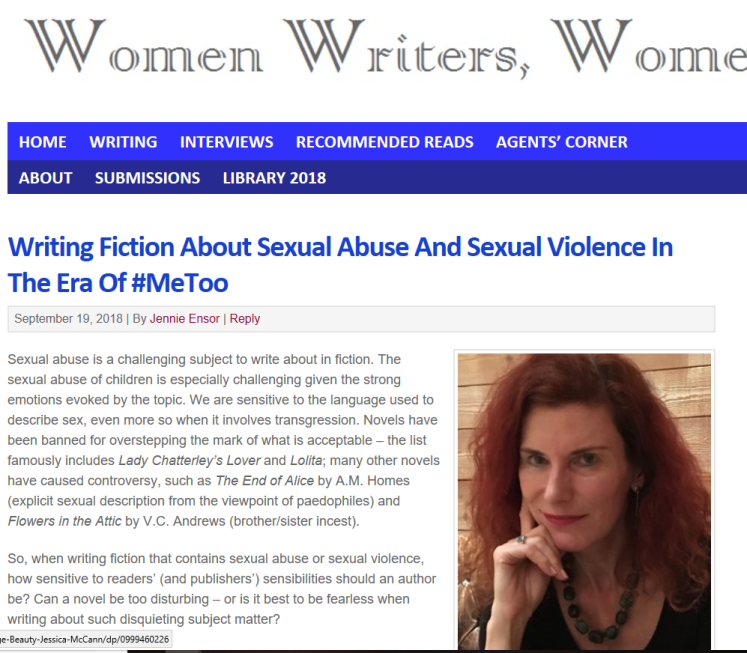Today I’m sharing a piece I wrote for the Women Writers, Women’s Books site, with my thoughts on how to approach writing about sexual abuse and sexual violence. Can a novel or short story be too disturbing? How sensitive to readers’ – and publishers’ – sensibilities should a writer be?
I’d love to hear your views on this. Comments welcome, whether or not you agree with me.

Source: Writing Fiction About Sexual Abuse And Sexual Violence In The Era Of #MeToo
Lady Chatterley’s Lover is a great book. It shows D.H. Lawrence’s talent as he deals with the taboo of sex, without sounding cheap and pornographic. And the book is not only about sex, it depicts the social conditions of the era, with his thoughts in depth, and paints the picture of a rich woman, with a disabled husband, who longs for love. I haven’t read Lolita, but I have seen both films, with Dirk Bogarde and Jeremy Irons. They were both very good, especially the latest one. Regarding The Girl in His Eyes, I think it’s one of the best books on child abuse, depicting the situation, yet telling the story in a way which doesn’t offend the reader. I’ll also mention A Single Man here, it’s not about sexual abuse, but the most daring book on homosexuality. I have read the book and watched the film. The plot details were slightly different in the film, but it was still good. I think it’s time for us to face the realities of life and break the taboos. We can’t go on pretending such sexual tendencies do not exist.
I think it’s time for us to face the realities of life and break the taboos. – absolutely, Sebnem! Too much is swept under the carpet. I will check out A Single Man. Thank you for your comment on The Girl IHE too, very much appreciated
Lady Chatterley’s Lover was an excellent book I thought and an example of reality making people uncomfortable with the resulting uproar. I think honesty should sometimes make people uncomfortable, it should make the guilty squirm and the ignorant open their eyes. Yes, it is time to speak about realities but of course it has to be done in a way that is not gratuitous and does not in any way hint at approval of, or the normalising of the unspeakable. Brave and fearless! and honest! that’s the way to go I reckon.
Good points. Sometimes breaking a taboo is going to have consequences – making some readers uncomfortable is one of them. To fearlessness…. in moderation!
A very conscious topic.
Let’s take Laurel K. Hamilton. Over the last decade the author has developed quite a taste for erotic adventure and misadventure alike. The most unusual is a snuff scene, perhaps the only one she’s written–I’m a bit behind in the Anita Blake series so that could be wrong. The scene was awkward and the character’s response to it was a bit unbelievable than the act itself (it involved werewolves or were-creatures). That awkwardness exhibits Hamilton’s lack of experience with real-life snuff activities. That would be quite extraordinary, indeed.
If a writer has never personally encountered sexual abuse, it is unlikely that the choice of words would ever transport a reader to a previous experience. If anything the piece would simply seem distasteful or too fantastical to matter.
We don’t always have to be successful and we trust our readers with sensibility. Its the reader’s responsibility to determine whether the author is trying to elicit emotion proper, or embellish the plot with some…imagination. On the other hand, while one reader may abhor the violence another could be thankful because they can tell, by the care taken to description, that the author understands. In this case, experience and perspective is everything or nothing.
Thank you for the thought-provoking material. It alone evokes some history. So at some point, forgiving fiction is a step toward moving on.